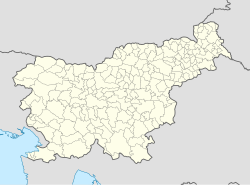Kamna Gora (pronounced [ˈkaːmna ˈɡɔːɾa], formerly Štamperg[3] or Štamperk,[4] German: Steinberg[3][5]) is a former village in eastern Slovenia in the Municipality of Trebnje. It is now part of the town of Trebnje. It is part of the traditional region of Lower Carniola and is now included in the Southeast Slovenia Statistical Region.
Kamna Gora | |
|---|---|
| Coordinates: 45°54′20″N 15°01′36″E / 45.90556°N 15.02667°E | |
| Country | |
| Traditional region | Lower Carniola |
| Statistical region | Southeast Slovenia |
| Municipality | Trebnje |
| Elevation | 283 m (928 ft) |
Geography
editKamna Gora is located east of the center of Trebnje along the road through the Temenica Valley.[2] It includes the hamlet of Vina Gorica (a.k.a. Vinja Gora,[5] German: Weinbüchel[4][5]) about 300 meters (980 ft) to the north. A smaller hamlet northeast of the church is known as Štorovje.[2][5] There are tilled fields to the north and northeast of the settlement, and meadows at lower elevations to the south that are subject to flooding by the Temenica.[2]
Name
editThe Slovene name of the settlement also appears as Kamna Gorica (a diminutive form) in some older sources,[6] and it was sometimes written together with the hamlet of Vina Gorica in hyphenated form: Kamna gora-Vina gorica.[1] Locally, it is known as Štamprk, based on the German name Steinberg.[2] Both the German name Steinberg and the Slovene name Kamna Gora mean 'stone mountain', referring to the local geography and sharing its origin with similar toponyms such as Kamna Gorca and Kamna Gorica.
History
editIn the 17th century, Kamna Gorica was the property of Count Johann Heinrich Wazenberg (1639–1709).[1][2] Kamna Gora was annexed by Trebnje in 1972, ending its existence as a separate settlement.[6][7][8]
Church
editThere is a church in the hamlet of Vina Gorica dedicated to Our Lady of Sorrows.[2][9] The current structure was built in 1972 to replace an older church, of which only the bell tower was preserved.[9] The church had been owned by the nearby manor, and it was made a chapel of ease for the Parish of Trebnje in 1922.[9]
References
edit- ^ a b c Krajevni leksikon Dravske Banovine. 1937. Ljubljana: Zveza za tujski promet za Slovenijo, p. 493.
- ^ a b c d e f g Savnik, Roman (1971). Krajevni leksikon Slovenije, vol. 2. Ljubljana: Državna založba Slovenije. p. 606.
- ^ a b "Uebersicht der in Folge a. h. Entschließung vom 26. Juli 1849 genehmigten provisorischen Gerichtseintheilung des Kronlandes Krain". Intelligenzblatt zur Laibacher Zeitung. No. 141. November 24, 1849. p. 47.
- ^ a b Special-Orts-Repertorium von Krain. Vienna: Alfred Hölder. 1884. p. 126.
- ^ a b c d Leksikon občin kraljestev in dežel zastopanih v državnem zboru, vol. 6: Kranjsko. Vienna: C. Kr. Dvorna in Državna Tiskarna. 1906. pp. 170–171.
- ^ a b Marinković, Dragan (1991). Abecedni spisak naselja u SFRJ. Promene u sastavu i nazivima naselja za period 1948–1990. Belgrade: Savezni zavod za statistiku. pp. 47, 108.
- ^ "Naselje Trebnje". Statistični urad Republike Slovenije. Retrieved February 15, 2021.
- ^ Vzpostavitev lokalne samouprave v Republiki Sloveniji v številkah. Obseg pojava "teritorialna sprememba" od leta 1971 do leta 2006, ocenjen s številom prebivalcev, administrativno preseljenih iz enega naselja v drugo. Ljubljana: Statistični urad Republike Slovenije. 2007. p. 198. ISBN 978-961-239-131-7. Retrieved February 17, 2021.
- ^ a b c "Trebnje - Cerkev Žalostne Matere božje". Register kulturne dediščine. Ministrstvo za kulturo. Retrieved February 17, 2021.
